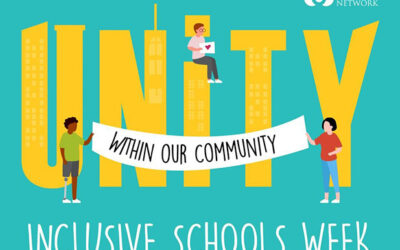Professional Learning Network
Inclusionary Practices News & Tips
AESD Inclusionary Practices (IP) supports coordinated professional learning for school leadership teams. Its purpose is to support educators and school leaders with developing and implementing sustainable systems, structures, and practices that support all students with meaningful access and engagement in inclusive learning environments.
AESD IP Podcast Series | The UDL Approach
As part of their inclusion work, AESD IP coordinators have been engaging in professional learning with renowned Universal Design for Learning (UDL) author and consultant Dr. Loui Lord Nelson. This professional learning led to the opportunity to be featured on Dr. Nelson’s podcast UDL in 15 Minutes. In 11 podcast episodes, school leaders and AESD IP coordinators from around the state share their stories of implementation, which you can listen to below. UDL is a framework to optimize teaching and learning for all people based on scientific insights into how humans learn. For more information, check out the full library of UDL in 15 Minutes podcasts or these other UDL resources published by Dr. Nelson.
Episode 98 - How students established the push for inclusion
Episode 97 - How one principal is dismantling self-contained classrooms with the help of UDL
Episode 96 - Student stories and the power of UDL from Castlerock Early Childhood Learning Center
Episode 95 – Janelle Bersch, Emily Wilgus, and Heidi Schroeder, Part 1
Episode 94 – Kelley Correio and Laurie Sarver
Episode 93 – Kathleen Lenihan and Courtney Sund
The Highland School District began their journey with UDL in 2019. In just three years, they’ve made measurable strides by adopting the 1% change concept. Small changes over time lead to big growth. Kathleen Lenihan and Courtney Sund share the steps they’ve taken during this journey.
Episode 92 – Lindsay Hicks
Lindsay Hicks Frazier, an inclusionary practice project lead who works through ESD 101, shares how Valley District’s leadership aligned around inclusive practices and how their professional development includes everyone, from teachers to bus drivers.
Episode 91 – Ann Renker and Victoria Kalscheuer
Episode 90 – Gahlya Auel and Liza Sejkora
Episode 89 – Jenny Parker
Episode 88 – Cassie Stevens and Lori Scott
Grade the work not the Timing
Traditionally, students have been penalized for the submission of late assignments. The thought process behind this has always been to reward the students who have followed instructions to the rule and met the deadline. In essence, the student is rewarded for following the teacher’s instructions. However, when we really think about this, what is happening is that students who for whatever reason, who cannot get their work in on the deadline are punished with the message that a true assessment of their knowledge is unimportant, and in fact they are graded on doing the teacher’s bidding. It is an environment of control and does not give the grade that does not reflect the student’s knowledge. This is based on teacher’s believing that they are teaching student’s responsibility, but it is a method that distracts from obtaining a bias-free true assessment of the student’s knowledge.
Additionally, late work penalties can disproportionately hurt the most vulnerable students. Students turn in assignments late for all sorts of reasons. They have few resources, weak prior knowledge, overwhelming schedules, a lack of engagement, stress, and simple forgetfulness. They may not have been able to entirely control all the circumstances that caused the assignment to be late, and our implicit biases influence the assumptions we make about whether they had. (Feldman, 2019, p. 115)
The educator who lowers grades for late work runs the risk of losing the student’s engagement and we need to hold on to the goal of the assessment which is to obtain an accurate reflection of the academic performance. As Feldman says meeting deadlines is a “soft skill” (Feldman, 2019) and is separate from content mastery.
Creating Meaningful IEP Meetings using Inclusionary Practices
By Lindsay Hicks-Frazer Inclusionary Practices Coordinator at NEWESD101
Special Educators have always been aware of the importance and impact of meaningful IEP meetings. However, the focus is often on the legalities required of certain teachers/admin/parents being in attendance and with hectic schedules, other commitments and a lack of substitute teachers, this presents as real daily problems. In truth, the case manager is often grateful to have successfully scheduled a time with a parent. Scheduling time for staff to at least partially attend an IEP meeting is an even bigger challenge. There is a real need to improve IEP meetings and focus on making them inclusive because data shows that meaningful collaboration in PLCs, or educators and family members in IEP meetings, results in strengthening experiences and outcomes for students (Schleifer,Rinehart & Yanisch, 2017). Inclusive IEP meetings bring everyone to the table to share meaningful and intentional plans to help students in meeting their personal and educational goals. Students spend on average 20% of their time in school and the other 80% out of school, therefore educators must learn about the interests, preferences and activities of students outside of the school day to deeply understand and connect with students. When educators know their learners, they are much better designers for them. Simply, one of the best ways to achieve this is to listen to the voices of students and their family members with the purpose of understanding the unique skills, interests, talents, needs and dreams of the learner and their family.
It is about reassessing the structure of the IEP meetings with intentionality. It starts with collaborative planning from outset, having clarity of purpose, enhancing collaborative school culture which leads to collective inquiry and a new reality. One tip is to ensure that all the parties involved have an active role in planning the agenda of an IEP meeting, afterall a student with an IEP is the responsibility of all educators in a school building: Cooperation vs Collaboration: When To Use Each Approach. It also gives educators a golden opportunity of including the input of the family which is not always possible with building PLC meetings. All educators can make the most of this space which encourages buy-in, commitment, and also ensures that the IEP meeting is not only inclusive but has an important place in data driven decision making.
How to get started:
- Establishing PLC Team Roles
- Big Idea #3: PLC Focus on Student’s Results
- How to (Really) Listen to Parents
- Effective Family Engagement Could Look Like This
- ABCs Family Engagement (PDF)
- Back To School Parent-To Parent-Guide To Inclusion
Other things to consider:
- Inclusion Q & A: A Parent’s Guide | LD OnLine
- Inclusive Education: Perceptions of Parents of Children with Special Needs of the Individual Program Planning Process
- School Inclusion | Center for Parent Information and Resources.
- Including Student Voice | Edutopia
- Elevating Student Voice in Education – Center for American Progress
- Teacher Collaboration In Perspective: A Guide to Research
- Schleifer, Chloe Rinehart and Tess Yanisch Teacher Collaboration In Perspective
Useful resources:
IP News & Stories
Inclusive Schools Week 2022
AESD Network, along with many other schools and organizations throughout the nation celebrate Inclusive School WeekTM during the first week in December. The Week highlights the progress that schools have made in implementing...
Inclusion in Action
Washington’s nine Educational Service Districts (ESDs), unified through the Association of Educational Service Districts (AESD Network), support 140 school/district teams across the state with implementing inclusionary practices. The AESD is one of several statewide...
Inclusive Education: Changing Seasons, Systems, & Practices
Winter is upon us once more and as we change our clothes, replace our sandals with boots, adjust to shorter days, and perhaps put winter tires on our vehicles, we are reminded of the constant changes in our lives. Some people relish the changing season, while others...
Have additional questions?
Contact your regional coordinator below!


